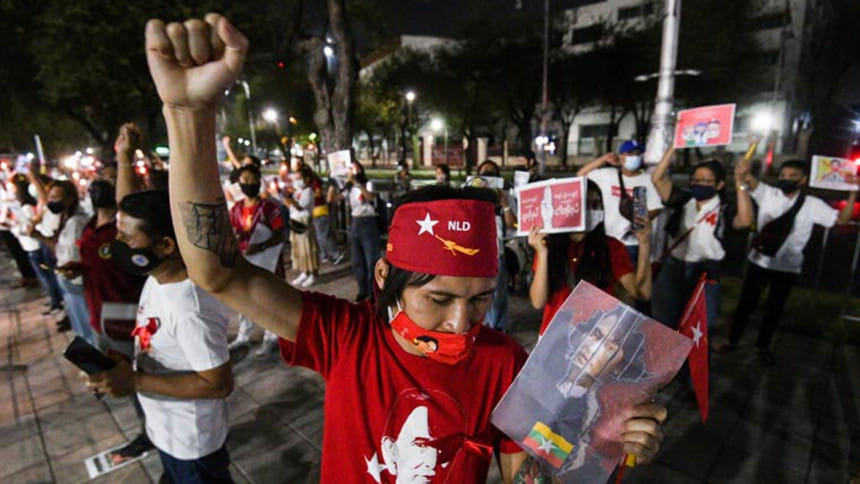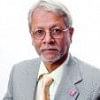‘Internal affairs’ suck under globalisation

I am not at all concerned about the Tatmadaw takeover in neighbouring Myanmar, a foregone conclusion, some say, to a power struggle in the land of a hundred ethnic groups, and was somewhat expected given the country's six decades' tradition of robust military interest in politics and governance. Such disinterest in "internal" matters of another country is common in my generation (guess which?) because we have been taught so. Hands and eyes off! No reference that to robustness.
USA is punishing Myanmar monetarily, New Zealand diplomatically, while adjacent Bangladesh, in dealing with an exodus of refugees, has been the epitome of collective patience, tolerance and love for mankind. When a people within a country suffers, the matter acquires global scent. Repression within borders cannot, nor should be protected as domestic violence, more so when you have to bear the brunt of the spoils of someone else's war.
We could be least interested in angry farmers' protest since late last November against some legislation introduced in September in next-door India, but we do suffer if the onion trucks stop rolling across the border. Despite the bitter winter up north, there is little sign of the standoff thawing, except for the farmers having to backpedal due to the uncharacteristic overenthusiasm of some in their midst on their Republic Day. Commendably though, both sides have shown utmost restraint, and mutual longing to resolve the impasse; as if there was any alternative.
Our lack of interest was, however, challenged when the war of words and repeated failed negotiations turned into an online Star Wars among some totally local, a few internationally local, and a handful of global celebrities. The world takes notice when there is twittering by Rihanna and Greta, retort by Sachin, and palta by Shatrughan and daughter. The matter then enlarges from internal to international, but with no malice.
Every now and then Uyghur pops up on TV scrolls for the wrong reasons, whereas they have a rich historical and cultural tradition. I for one never knew about this Xinjiang province until external media broke news time and again claiming that Chinese Muslims in their thousands were being detained in camps, away from homes, and subjected to rigorous edification towards targeted orientation. Many countries, including those standing on the high pedestal of self-proclaimed morality, as custodians of the world, practice such indoctrination; they are called print, electronic and social media.
China denies the allegations and claims that the men from Uyghur, as well as members of other ethnic minority groups, are being trained for social integration to counter extremism and terrorism; in large groups yes, because it is the most populous country. China's internal matter was caught on the world's radar of conscience because it seemed humanity was lacking. It could be a matter of misinterpretation by either side, sometimes defended as cultural difference.
Pakistan too in 1971 defended the indiscriminate killing of innocent Bangalee in their thousands as an internal matter, but not for long. Their citizens too were kept in the dark about the brutal force employed on the liberated former eastern wing, and their subsequent losses. Whereas in that era of limited transmission of information, it was possible to hoodwink a global audience, after five decades of leaps and bounds in e-communication, not much can be swept today under the carpet. There lies the socio-political positive impact of technological advancement in global communication of information.
Some government spokespersons, more so state lackeys, try to mute genuine global interest in their country's people as out-of-bound "internal" matter. "Patriotic" conspiracy theorists, and there is a steady supply in every country, will go the extra yard to dub transnational interest in any domestic affair as part of a smear campaign to defame that country; as if a country's reputation is that much trivial. Nay! A nation has forever been larger than a tweet, even before the arrival of tweets.
Some countries do not care. They are above this "internal" conspiracy syndrome. We rose up as one world when BLM came alive after the brutal killing of George Floyd on May 25, 2020 at Minneapolis, Minnesota. The "8 minutes and 46 seconds" knee lock was never defended as an internal affair, despite the fact that there was universal shock and condemnation.
A three-year-old Syrian boy Alan Kurdi was found dead on September 2, 2015, his head buried in the sands of a Turkish beach. Alan's mother and brother also perished in the Mediterranean Sea. The deaths were not swept away as an internal affair of either country, nor of Greece which the boy's family was trying to reach, or of Canada, where they wanted to settle. In fact, the deaths and the wider refugee crisis became a factor in the subsequent Canadian federal elections. Nothing was "internal" any more.
There was widespread international "interference". French President François Hollande called Turkish President Recep Erdoğan, not to blame him but reciprocally appealed for a more humane response to the world's refugee crisis. Borders were broken and world leaders were moved. They discussed about their responsibility towards migrant populations, who were risking their lives not necessarily by choice, but usually under duress
Taking notice is not interference. That's a lame excuse to shun criticism or conceal a guilt. It is natural human instinct to be interested in current affairs. Nipping external interest in the bud as a keep-off policy is a poor pretext to continue oppressive measures on one's own people.
Worldwide, we are willing to take advantage of globalisation where social and cultural influences merge to affect an array of governance parameters. We are enthusiastic to reap the fruits of a global village, and yet are not prepared to invite opinions that favour the persecuted amongst our own.
Political matters of a country are definitely internal, but up to a point where there is no undue discrimination and tyranny. About humanity issues, we can all be concerned. Of course, every self-ruling country has to sort out its own mess, but if the dirty linen is on show, others are bound to talk. It's only human.
Dr Nizamuddin Ahmed is a practising architect, a Commonwealth Scholar and a Fellow, a Baden-Powell Fellow Scout Leader, and a Major Donor Rotarian.

 For all latest news, follow The Daily Star's Google News channel.
For all latest news, follow The Daily Star's Google News channel. 



Comments